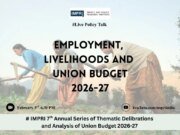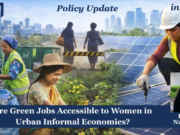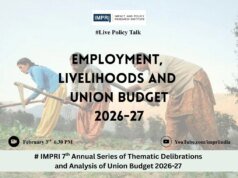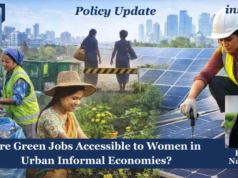Policy Update
Parth Lathiya
Background:
The India–United Kingdom Free Trade Agreement (FTA) represents a significant milestone in the evolving trajectory of bilateral relations between two democracies which share a colonial history, a vibrant diaspora, and strategic economic interests in the contemporary world. This agreement finalized in May 2025 after more than three years of negotiation and fifteen rounds of formal discussions with higher level of delegates between the countries. It is expected to become India’s most ambitious trade pact with a Western economy since the signing of the India–UAE CEPA in 2022. For the United Kingdom, it is the most substantive bilateral trade deal post-Brexit, as the UK wants to strengthen economic partnerships outside the European Union.
The genesis of the FTA can be traced to the 2030 Roadmap signed in 2021, which outlined the contours of a comprehensive strategic partnership. The roadmap emphasized enhanced trade, investment, defence cooperation, and mobility of people. Both countries have already reached USD 56 billion and have a target to double this by 2030. Additionally, there was a growing recognition on both sides that a structured and liberalized trade framework could provide a mutually beneficial growth to their dynamic economy.
The current FTA is expected to deepen economic integration and resolve complex issues such as tariff concessions, investment protections, social security coordination, and rules of origin. Beyond commerce, the FTA also signals from both countries to have a strategic alignment rooted in a shared vision for a multipolar, rules-based global order in the international system.
Objectives and Provisions:
At its core, the India–UK Free Trade Agreement is driven by the desire to modernize the bilateral economic relationship in a manner that reflects the realities of existing global structure. For India, the FTA is an opportunity to expand its export base, attract higher-value investments in the financial market and secure easier access for skilled professionals in key service sectors. For the UK, the deal offers a chance to collaborate more deeply in the Indo-Pacific economic architecture and diversify its trade from the European Union.
The agreement has four principal objectives. First, it seeks to significantly reduce tariff and non-tariff barriers on a wide range of goods. The UK has committed to phasing out import duties on nearly 99% of Indian exports—including textiles, footwear, marine products, and jewelry sectors. India will also lower its historically steep tariffs on Scotch whisky, high-end automobiles, and medical equipment. These reductions aim to balance domestic sensitivities as well as mutual gains from both sides.
Second, the FTA expands market access in services through provisions of cooperation and mutual recognition of qualifications. This aligns with India’s strategic goal of services-led growth as it believes services offer a fast and reliable path to economic development.
Third, the pact introduces a landmark Social Security Agreement, under which Indian professionals working temporarily in the UK will be exempt from double social security contributions—an issue which is historically raised by Indian IT firms and migrant workers intermittently.
Lastly, the agreement includes forward-looking chapters on digital trade, intellectual property, sustainable development, and investment facilitation, and ensures that the overall framework remains adaptable to future economic transitions. In broader strategic terms, the FTA reflects a shift from transactional trade negotiations to a rules-based economic partnership which are rooted in shared democratic principles and mutual respect.
Political and Economic Implications:
| Cluster | Subdomain | Implication |
| Domestic Political Impact | India’s Internal Balancing | Mixed reactions: sectors like textiles and pharma welcome the gains, However, auto and electronics industries fear increased due to foreign competition. |
| UK’s Post-Brexit Strategy | Seen as a flagship deal as it helps justify Brexit by showcasing new global trade partners. It also influences upcoming elections and policy narratives. | |
| Strategic Diplomacy | Indo-Pacific Focus | Enhances India’s role in UK’s Indo-Pacific tilt. Both countries have signalled the alignment towards a multipolar, rules-based international order. |
| Counterweight to China | It will Strategically reduce over-dependence on Chinese markets and supply chains, especially in pharmaceuticals and critical tech. | |
| Macroeconomic Impact | Trade Volume & GDP | Expected to double bilateral trade by 2035. UK GDP projected to rise by £4.8 billion. |
| Job Creation & Investment | Boost in skilled job creation. Encourages UK investment in Indian manufacturing and clean energy. | |
| Sectoral Effects | Services & Professional Mobility | India gains partial success in IT and legal services access; UK’s cautious stance on full mobility remains a limitation. |
| SMEs & Regional Economies | Positive export potential for MSMEs, but capacity building is needed to meet rules of origin and product standards. |
Emerging Issues:
Despite the comprehensive nature of the India–UK FTA, several unresolved issues could hinder its implementation:
- Non-Tariff Barriers (NTBs): Despite the significant tariff cuts, there are issues such as regulatory misalignments in key sectors, licensing delays from authorities, and divergent technical standards particularly in agriculture and pharmaceuticals sectors create hindrance for Indian exports.
- Services Liberalization Gaps: India’s demand for freer movement of professionals remains unmet. The UK has offered limited access in specific sectors for example in legal, healthcare sectors etc., which ultimately restricts India’s services export overall potential.
- Limited Gains for MSMEs: Indian MSMEs may struggle to comply with UK rules on origin and sustainability standards. Without comprehensive support, there is risk of exclusion from export gains.
- Ambiguity on Carbon and Digital Trade Norms: Sustainability and digital trade chapters are non-binding. Future UK regulations, specifically as carbon taxes and digital data restrictions, may create implicit trade barriers for India.
- Implementation Risks: Political leadership changes as well as domestic lobbying in either country could delay regulatory alignment and can potentially weaken enforcement of the agreement’s provisions.
These issues suggest that the FTA’s long-term credibility will depend on consistent bilateral dialogue among partner countries where they can formally establish dispute resolution mechanisms to solve issues and create an inclusive environment for adoption of policy at the sub-national level.
Way Forward:
The India–UK Free Trade Agreement is not just a shift in the trajectory of bilateral trade, but it can be considered as a strategic recalibration of two democracies towards a more interdependent global role. The agreement secures ambitious tariff reductions and market access, but its real strength lies in its ability to modernize bilateral cooperation which is expanding beyond goods and services, towards — digital trade, sustainability, and mobility that is needed in the twenty-first century. Yet, a signed document does not automatically guarantee results. The future will depend on whether both countries can translate commitments into institutional mechanisms that are inclusive, adaptive, and forward-looking.
India must prioritize enabling frameworks that support micro, small, and medium enterprises (MSMEs), which will otherwise be unable to fully leverage the benefits of this partnership. Similarly, sub-national governments, especially in export-intensive states, should be integrated into implementation strategies to ensure that gains are geographically equitable. At the same time, The United Kingdom must demonstrate that its post-Brexit economic outreach is not merely symbolic but structurally beneficial to partners like India through fulfilling commitment specially through sustained investment.
As Prime Minister Narendra Modi stated during his 2021 visit to the UK, “The partnership between India and the UK is not just a meeting of governments—it is a living bridge connecting our people, ideas, and aspirations.” This statement is a cornerstone of India-UK partnership which is not only built on shared interests but on shared futures in a rapidly transforming world.
References:
- Badiani, R., Gerhard, J., Kumar, D., Luchnikava-Schorsch, H., & Shukla, S. (2025, July 10). Implications of the India–UK Free-Trade Agreement. S&P Global Market Intelligence. https://www.spglobal.com/market-intelligence/en/news-insights/research/india-uk-free-trade-agreement-implications
- Department for Business and Trade. (2025, July 24). Impact assessment of the Free Trade Agreement between the UK and India: Executive summary (web version). UK Government. https://www.gov.uk/government/publications/uk-india-free-trade-agreement-impact-assessment/impact-assessment-of-the-free-trade-agreement-between-the-uk-and-india-executive-summary-web-version
- Elliott, D. (2025, May 9). The UK and India just signed a ‘historic’ free trade deal. Here’s what to know. World Economic Forum. https://www.weforum.org/stories/2025/05/uk-india-free-trade-deal/
- Malhotra, S. (2025, May 14). The India–UK Free Trade Agreement: A deal at last. Observer Research Foundation. https://www.orfonline.org/expert-speak/the-india-uk-free-trade-agreement-a-deal-at-last
- Pant, H. V., & Malhotra, S. (2025, July 26). UK and India finally shed the baggage of history [Research article]. Observer Research Foundation. https://www.orfonline.org/research/uk-and-india-finally-shed-the-baggage-of-history
- Press Information Bureau. (2025, July 27). India and the United Kingdom sign the Comprehensive Economic and Trade Agreement (CETA). Government of India. https://www.pib.gov.in/PressNoteDetails.aspx?id=154945&NoteId=154945&ModuleId=3
- Press Information Bureau / Observer Research Foundation. (2025, July 25). Whisky, wages and the new India–UK trade deal. ORF Expert Speak. https://www.orfonline.org/expert-speak/whisky-wages-and-the-new-india-uk-trade-deal
About the contributor:
Parth Lathiya is a Research Intern at the Impact and Policy Research Institute (IMPRI). He is currently pursuing his master’s degree in political science and international Relations at the University of Hyderabad (HCU), Telangana. His academic interests lie in emerging technologies and their regulatory frameworks in India.
Acknowledgement:
The author sincerely thanks Ms. Aasthaba Jadeja and IMPRI fellows for their valuable contribution.
Disclaimer:
All views expressed in the article belong solely to the author and not necessarily to the organization.
Read more on IMPRI:
Policies in Action: Understanding Media’s role as a Stakeholder in Healthcare Interventions
India’s Startup Engine: A Policy Review of the Fund of Funds Initiative (2016)



















